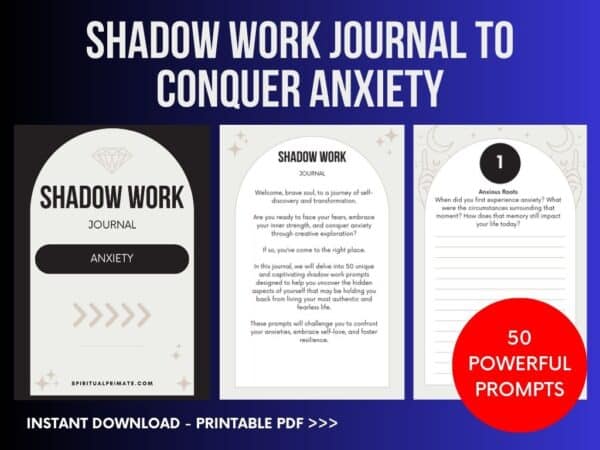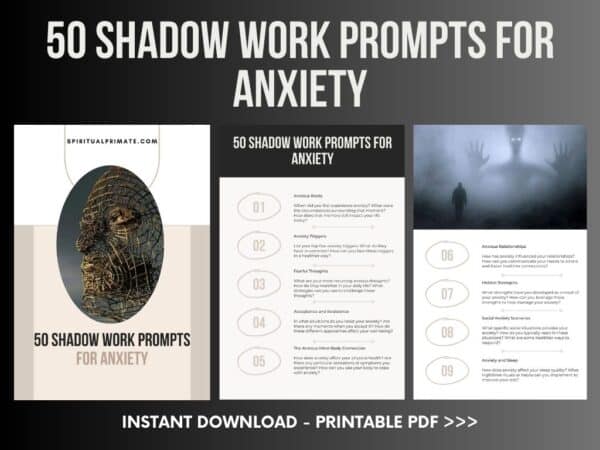Welcome, brave soul, to a journey of self-discovery and transformation. Are you ready to face your fears, embrace your inner strength, and conquer anxiety through creative exploration? If so, you’ve come to the right place.
In this guide, we will delve into 50 unique and captivating shadow work prompts designed to help you uncover the hidden aspects of yourself that may be holding you back from living your most authentic and fearless life. These prompts will challenge you to confront your anxieties, embrace self-love, and foster resilience. So, prepare to embark on an adventure of introspection and growth, and remember, the only way out is through.
As you start this journey, ask yourself: Am I ready to face my shadows and unlock the full potential of my inner world?

Anxiety Unraveled: Understanding the Complex Emotion
What is Anxiety?
Anxiety is a feeling of unease, worry, or fear that arises due to uncertainty or perceived threats. It is a normal and essential part of our emotional spectrum, helping us stay alert and prepared for potential challenges. However, when anxiety becomes overwhelming or persistent, it can interfere with our daily lives and well-being.
Types of Anxiety
There are various forms of anxiety, and understanding the differences can help us better manage our emotional experiences. Some common types of anxiety include:
1. Generalized Anxiety Disorder (GAD) – characterized by excessive and persistent worry about everyday situations.
2. Social Anxiety – the fear of being judged, embarrassed, or humiliated in social situations.
3. Panic Disorder – sudden and intense feelings of terror, leading to physical symptoms such as racing heart, sweating, and shortness of breath.
4. Phobias – specific irrational fears of certain objects or situations, like heights or spiders.
Causes of Anxiety
Anxiety can be triggered by a variety of factors, including genetic predisposition, brain chemistry, personality traits, and life experiences. External stressors like financial issues, relationship problems, or work pressure can also contribute to anxiety.
Recognizing Anxiety
Some common signs and symptoms of anxiety include:
– Feeling restless or on edge
– Constant worry or overthinking
– Difficulty concentrating
– Irritability
– Sleep disturbances
– Rapid heartbeat or shortness of breath
Managing Anxiety
While anxiety can be challenging to cope with, there are strategies that can help alleviate its impact on our lives. Some effective ways to manage anxiety include:
– Talking to a mental health professional
– Practicing relaxation techniques, such as deep breathing or meditation
– Regular exercise
– Maintaining a balanced diet and getting enough sleep
– Seeking support from friends and family
– Limiting exposure to stressors and triggers
Anxiety is a complex and multifaceted emotion that can be both a natural response to stress and a disruptive force in our lives. By understanding the different types of anxiety, recognizing its symptoms, and learning effective coping strategies, we can better navigate the challenges that anxiety presents.
So, the next time you feel anxious, remember that you’re not alone and that there are ways to manage this common emotional experience.

Shadow Work: A Path to Overcoming Anxiety
Anxiety is a common emotional experience that affects people from all walks of life. While various coping strategies like therapy, medication, and relaxation techniques are widely acknowledged, one lesser-known approach to managing anxiety is shadow work. This psychological practice, rooted in the theories of Swiss psychiatrist Carl Jung, can help individuals confront and integrate their “shadow selves,” ultimately leading to reduced anxiety and improved overall well-being.
Understanding the Shadow Self
Jung believed that the human psyche is composed of multiple aspects, one of which is the shadow self. The shadow self represents the unconscious part of our minds that contains repressed emotions, desires, and fears. These hidden aspects often arise in our behavior and thoughts as projections, manifesting through negative emotions such as anxiety, anger, or jealousy.
The Role of Shadow Work in Addressing Anxiety
Shadow work is the process of exploring, acknowledging, and integrating the shadow self. By delving into these hidden aspects of our psyche, we can begin to understand the underlying causes of our anxiety and address them more effectively. The key steps in shadow work include:
1. Self-Reflection: Becoming more self-aware and recognizing the thoughts, feelings, and patterns that trigger anxiety. This can be done through journaling, meditation, or simply observing your emotional reactions in various situations.
2. Acceptance: Embracing the shadow self without judgment or criticism, understanding that it is an integral part of who you are. This acceptance encourages self-compassion and reduces feelings of shame, guilt, or fear associated with anxiety.
3. Integration: Integrating the shadow self with the conscious mind, allowing for greater self-understanding and emotional balance. This can lead to healthier coping mechanisms and a more authentic expression of oneself.
Benefits of Shadow Work for Anxiety
By practicing shadow work, individuals can experience several benefits in relation to anxiety management:
– Reduced Anxiety Symptoms: As individuals uncover the root causes of their anxiety and integrate their shadow selves, they often experience a decrease in anxiety symptoms and an improved ability to cope with stress.
– Increased Self-Awareness: Shadow work promotes a deeper understanding of one’s emotions, thoughts, and motivations, leading to greater self-awareness and emotional intelligence. This can help individuals better navigate their relationships and daily life.
– Personal Growth: Confronting and accepting the shadow self can lead to significant personal growth, as individuals learn to embrace their authentic selves and develop healthier coping mechanisms.
– Improved Relationships: By understanding and addressing the sources of their anxiety, individuals can improve their communication and emotional expression in relationships, leading to stronger personal connections.
Shadow work is a powerful tool in the quest to overcome anxiety. By bringing awareness to the unconscious aspects of the self, individuals can address the root causes of their anxiety, develop healthier coping strategies, and experience personal growth. Although shadow work may not be a substitute for professional therapy or medical intervention, it can be a valuable complement to other anxiety-management techniques.

Shadow Work Prompts for Anxiety
1. Anxious Roots: When did you first experience anxiety? What were the circumstances surrounding that moment? How does that memory still impact your life today?
2. Anxiety Triggers: List your top five anxiety triggers. What do they have in common? How can you face these triggers in a healthier way?
3. Fearful Thoughts: What are your most recurring anxious thoughts? How do they manifest in your daily life? What strategies can you use to challenge these thoughts?
4. Acceptance and Resistance: In what situations do you resist your anxiety? Are there any moments when you accept it? How do these different approaches affect your well-being?
5. The Anxious Mind-Body Connection: How does anxiety affect your physical health? Are there any particular sensations or symptoms you experience? How can you use your body to cope with anxiety?
6. Anxious Relationships: How has anxiety influenced your relationships? How can you communicate your needs to others and foster healthier connections?
7. Hidden Strengths: What strengths have you developed as a result of your anxiety? How can you leverage these strengths to help manage your anxiety?
8. Social Anxiety Scenarios: What specific social situations provoke your anxiety? How do you typically react in these situations? What are some healthier ways to respond?
9. Anxiety and Sleep: How does anxiety affect your sleep quality? What nighttime rituals or habits can you implement to improve your rest?
10. Anxiety and Personal Growth: How has anxiety contributed to your personal growth? What important lessons have you learned from your struggles with anxiety?
11. The Anxious Inner Critic: What does your inner critic say when you’re feeling anxious? How can you develop a more compassionate inner voice?
12. Anxiety and Boundaries: How do your anxiety levels change when you set boundaries with others? What are some boundaries you need to establish to protect your mental health?
13. Anxiety and Nourishment: How does your diet affect your anxiety? Are there any foods or eating habits that contribute to your anxiety levels?
14. Anxiety and Creativity: How can you use your anxiety as fuel for your creative pursuits? What artistic outlets help you process your emotions?
15. Anxious Routines: How do your daily routines impact your anxiety? What changes can you make to create a more calming and supportive environment?
16. Anxiety and Self-Compassion: How can you practice self-compassion when dealing with anxiety? How does self-compassion change your relationship with anxiety?
17. Anxiety and Gratitude: How can focusing on gratitude help alleviate your anxiety? What are some daily gratitude practices you can incorporate into your life?
18. Anxiety and Mindfulness: How does practicing mindfulness affect your anxiety? What mindfulness techniques can you use to cope with anxiety?
19. Anxiety and Nature: How does spending time in nature influence your anxiety levels? What natural settings provide the most comfort and relief for you?
20. Anxiety and Movement: How does physical movement help you manage anxiety? What forms of exercise or movement practices resonate with you?
21. Anxiety and Laughter: How can humor help you cope with anxiety? What makes you laugh and how can you incorporate more laughter into your life?
22. Anxiety and Mantras: What mantras or affirmations can you use to combat anxiety? How do these words of encouragement affect your mindset?
23. Anxiety and Journaling: How does the act of writing about your anxiety help you process your emotions? What journaling prompts or techniques work best for you?
24. Anxiety and Visualization: How can visualization techniques help you manage anxiety? What calming or empowering images can you conjure in your mind?
25. Anxiety and Music: How does music affect your anxiety? What songs or genres help soothe your anxious thoughts?
26. Anxiety and Rituals: What rituals or ceremonies can you create to help you cope with anxiety? How do these practices provide comfort and grounding?
27. Anxiety and Connection: How does connecting with others help you manage anxiety? What supportive relationships or communities can you turn to?
28. Anxiety and Forgiveness: How can practicing forgiveness help you cope with anxiety? Who do you need to forgive, including yourself, to move forward?
29. Anxiety and Time Management: How does your relationship with time contribute to your anxiety? What changes can you make to your schedule or time-management strategies to reduce stress?
30. Anxiety and Control: In what areas of your life do you feel the need to maintain control? How can you practice surrendering control and trusting the process?
31. Anxiety and Vulnerability: How does embracing vulnerability help you cope with anxiety? What fears or insecurities do you need to face?
32. Anxiety and Empathy: How can practicing empathy for others help you manage your anxiety? How does understanding other perspectives shift your focus?
33. Anxiety and Escapism: What forms of escapism do you use to avoid your anxiety? How can you confront your emotions head-on instead of seeking distractions?
34. Anxiety and Breathing: How does focusing on your breath help you manage anxiety? What breathing techniques can you use to find calm?
35. Anxiety and Intuition: How does your anxiety affect your intuition? How can you learn to trust your gut instincts despite anxious thoughts?
36. Anxiety and Identity: How has anxiety shaped your sense of self? How can you redefine your identity beyond your anxiety?
37. Anxiety and Courage: How has facing your anxiety required courage? What brave actions can you take to confront your fears?
38. Anxiety and Hobbies: What hobbies or pastimes help you cope with anxiety? How can you make time for these activities in your daily life?
39. Anxiety and Pets: How do animals help you manage your anxiety? What lessons can you learn from your pets or other creatures?
40. Anxiety and Assertiveness: How can you practice assertiveness to help manage your anxiety? What situations require you to be more assertive?
41. Anxiety and Solitude: How does spending time alone affect your anxiety? What benefits can solitude bring to your mental health?
42. Anxiety and Beauty: How can you find beauty in your anxiety? What does it teach you about yourself and the world around you?
43. Anxiety and Goals: How does anxiety impact your goal-setting and achievement? How can you set realistic and attainable goals despite your anxiety?
44. Anxiety and Adaptability: How has anxiety taught you to be adaptable? How can you use your adaptability skills to help manage your anxiety?
45. Anxiety and Resilience: How has overcoming anxiety helped you build resilience? What strategies can you use to bounce back from anxious moments?
46. Anxiety and Affirmations: What positive affirmations can you use to counteract anxious thoughts? How do these uplifting statements affect your mindset?
47. Anxiety and Patience: How can practicing patience help you cope with anxiety? What situations require patience and understanding?
48. Anxiety and Perspective: How can changing your perspective help you manage anxiety? What alternative viewpoints can you consider?
49. Anxiety and Legacy: How do you want to be remembered beyond your anxiety? What impact do you want to leave on the world?
50. Anxiety and Self-Love: How can you practice self-love when dealing with anxiety? How does self-love change your relationship with anxiety and yourself?
Congratulations, intrepid explorer, for traversing the depths of your inner landscape and tackling these 50 transformative shadow work prompts! By now, you should have a greater understanding of yourself and a newfound appreciation for the power of self-reflection. Remember that anxiety is a natural part of life, and embracing our shadows is key to unlocking our inner strength and resilience.
As you continue on your journey of personal growth, don’t forget to revisit these prompts and explore new avenues of self-discovery. As you move forward, consider this question: What new possibilities have emerged through my willingness to confront and conquer anxiety, and how can I continue to harness the power of shadow work to shape my future?
Dive Deeper Into Your Shadow Work Journey
- Product on sale
 Printable Shadow Work Journal to Conquer Anxiety [PDF]Original price was: $11.98.$5.99Current price is: $5.99.
Printable Shadow Work Journal to Conquer Anxiety [PDF]Original price was: $11.98.$5.99Current price is: $5.99. - Product on sale
 50 Shadow Work Prompts for Anxiety | Printable PDFOriginal price was: $5.98.$2.99Current price is: $2.99.
50 Shadow Work Prompts for Anxiety | Printable PDFOriginal price was: $5.98.$2.99Current price is: $2.99.

